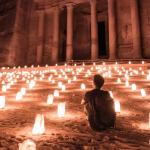The Adventurous Lectionary -The Third Sunday in Lent – March 12, 2023
Exodus 17:1-7; Psalm 95; Romans 5:1-11;. John 4:1-42
There is a tradition of banning the word, “Hallelujah,” during Lent. Lent, it is perceived, should be a time of confession, self-examination, sacrifice, and repentance for our evil ways, materialism, and ego. “Hallelujah” points to the goodness, bounty, and joy of life.
NO LENT CANCEL CULTURE. I have never bought into the Lent cancel culture. I believe that repentance and confession cannot occur in a bleak world with a bleak and judgmental God. Rather, we confess only if we believe forgiveness and transformation are possible, and that God is loving, bountiful, and forgiving. The point of Lenten simplicity and sacrifice is not mortification, but authenticity and experiencing God’s abundant life and blessing. So, in that spirit, I say “Hallelujah” or “Alleluia.” Our Alleluias are about God’s grace and bounty and not our ego or acquisitiveness.
Hallelujah is the spirit of Psalm 95, which sets the stage for this week’s readings. Joy, gratitude, and trust characterize the Psalmist’s relationship with God. Singing praise for all that God is and what God has done is at the heart of a holistic faith. Divine providence is at work in the micro and the macro, in the human and non-human worlds. In the spirit of Psalm 150, we can affirm that God breathes through all things and that humans and non-humans praise God as they fulfill their appropriate vocations in their own particular context. God’s ubiquitous creativity and wisdom reminds us that despite the imperfections of life, we are always Home.
DIVINE DELIVERENCE. In the reading from Exodus, the Israelites temporarily forget God’s miraculous deliverance from Egyptian bondage. They long for security, and doubt God’s providence. Despite their infidelity, God provides. Moses strikes a rock from which the waters of life flow. Regardless of what we do, God is faithful and will provide a way where there is no way. “All they have needed, God has provided,” but they just don’t know it. The water was already there, just waiting for their transformed perception, and trust in their liberator.
We also follow God’s way one moment at a time. We are also forgetful of the grace that guides our lives. We want to go it alone, as personal and in our communal and national life. We think being “first” protects us from life’s vicissitudes when, in fact, the self-made person or nation is the most fragile entity. In God’s realm, there is no “America first,” “white privilege,” or “wall that divides.” Such attitudes are based on scarcity thinking, fear, and egocentricity, and are antithetical to divine providence and grace. Such negative approaches to life will eventually lead to personal and national collapse.
UNIVERSAL GRACE. Romans 5 describes the priority and ubiquity of grace. We can live confidently – even in our suffering – because of God’s prevenient grace. God’s grace overcomes our sin, delivers us from fear, and provides a way forward in an ambiguous world. This grace applies to everyone – friend and foe, Jew and Gentile, Christian and Muslim, American and Syria. Like the children of Israel, we are encircled by grace. The challenge is our forgetfulness of all that God has done and is doing for us.
The apostle is aware of the reality of sin and alienation. The sin of Adam – the imperfection and waywardness of life – is ubiquitous. But, grace is always greater than our sin, and with grace, we can begin again. We can’t escape life’s ambiguities and imperfections, but we don’t need to be dominated by them. God’s power to save is all-encompassing and by comparison, sin’s impact is finite and temporary. Grace abounds. Before we can do anything to earn our salvation, God’s grace saves us. Christ dies for us, redeeming our brokenness and giving us the power and energy to begin again. This is true in a time when we have gone astray and our waywardness threatens the planet, future generations, and the soul and survival of the nation.
LIVING WATER. The encounter of Jesus with the woman at the well is best suited for a readers’ theatre, liturgical dance, or biblical storytelling. Its length makes it challenging for preacher and congregation alike. Still, the message is powerful. First, Jesus breaks down the barriers that imprison persons and communities – he breaks down the barriers of sex, ethnicity, ethics, marital status, and religion. Grace is insidious in its challenge of our prejudice and privilege. Moreover, grace overcomes our ethical and religious distinctions of clean and unclean, pure and impure, and in and out. The woman at the well could just as easily be seen as transgendered, lesbian, an undocumented immigrant, as a person “living in sin.”
God’s Spirit cannot be localized. The Spirit goes where it will – it can’t be encompassed by religious orthodoxy, ritual, nationality, or ethical qualification. God’s Transforming Spirit heals and cleanses without regard to human convention. We can’t wall the Spirit in or out. It is not our possession or ours to control. God’s living waters are for all.
The woman at the well rightly wants living waters. She wants something that cannot be taken from her. She wants the refreshment that only Divine Providence can give. This is also what we desire. We want the constancy of divine refreshment to quench our own spiritual thirsts and restore us to wholeness. Jesus is here, the waters are here, grace abounds.
Today’s scriptures center on what God has done and still can do for us. God delivers us from bondage, refreshes our spirits, quenches our thirst, forgives our sins, and enables us to face suffering. The theocentric nature of these passages challenges us to inclusive spirituality and ethics. The ubiquity of grace challenges us to be graceful; the priority of grace invites us to be hospitable; the undeserved nature of grace inspires us to forgiveness and boundary breaking for faith.
+++
Bruce Epperly is a pastor, professor, spiritual guide, and author of over seventy books, including THE ELEPHANT IS RUNNING: PROCESS AND OPEN AND RELATIONAL THEOLOGY AND RELIGIOUS PLURALISM; PROPHETIC HEALING: HOWARD THURMAN’S VISION OF CONTEMPLATIVE ACTIVISM; MYSTIC’S IN ACTION: TWELVE SAINTS FOR TODAY; WALKING WITH SAINT FRANCIS: FROM PRIVILEGE TO ACTIVISM; MESSY INCARNATION: MEDITATIONS ON PROCESS CHRISTOLOGY, FROM COSMOS TO CRADLE: MEDITATIONS ON THE INCARNATION, and THE PROPHET AMOS SPEAKS TO AMERICA. His most recent book is TAKING A WALK WITH WHITEHEAD: MEDITATIONS WITH PROCESS-RELATIONAL THEOLOGY. He can be reached at drbruceepperly@gmail.com















